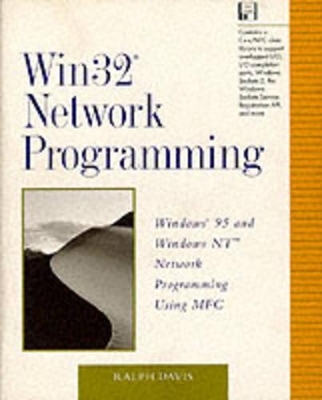
Win32 Network Programming
Addison Wesley
978-0-201-48930-9 (ISBN)
- Titel ist leider vergriffen;
keine Neuauflage - Artikel merken
WindowsA (R) 95 and Windows NTaA A coexist in many networked environments, and the two operating systems share a common networking API. However, there are some important differences in their capabilities and implementation. Win32A (R) Network Programming shows programmers how to build networked applications that leverage 32-bit features and functionality, covering both Windows 95 and Windows NT 4.0. From an industry veteran and a leading authority on network programming, the comprehensive coverage of Windows networking in this book includes: *strategies for building successful applications *discussion of overlapped I/O, I/O completion ports, Windows Sockets (including Winsock 2), the Service Registration API, the Win32 Security API, RPC, and Named Pipes *how to apply the Microsoft Foundation Classes and object-oriented programming principles to Win32 network programming and use them to hide the differences between Windows NT and Windows 95 Included on the disk are code examples from the book: a C++/MFC class library that extends MFC to support overlapped I/O, I/O completion ports, Windows Sockets 2, the Windows Sockets Service Registration API, and related functionality.0
201489309B04062001
Ralph Davis is a professional programmer, programming consultant, and writer. He has taught Windows network programming at numerous companies including Digital Equipment Corporation. 0201489309AB04062001
(Most chapters end with a Conclusion and Suggested Readings.)
Acknowledgments.
1. Introduction.
Installing the Disk 6 Using the Code 6 Problems, Assistance, and Upgrades 7.
2. Exception Handling.
Win32 Exception Handling.
C++ Exception Handling.
Combining Win32 and C++ Exception Handling.
3. Win32 Memory Allocation.
States of Memory.
The Virtual Memory API.
Heap Memory Allocation.
A Little PWALK through Memory.
C++ and MFC Considerations.
4. Multithreading.
What are Threads?
Multithreaded Application Architectures.
CreateThread().
The Thread Entry-Point Function.
_beginthread()/_beginthreadex().
AfxBeginThread() and the CWinThread Class.
Which API Should You Use?
Killing Threads.
Thread Synchronization
Code Listings.
5. Synchronization Objects.
The Wait Functions.
The Mechanics of the API.
Code Listing.
C++ and MFC Considerations.
Using the MFC Synchronization Object Classes.
6. Win32 File I/O.
Basic File I/O Operations.
Overlapped I/O.
Using Overlapped I/O--The cat Utility.
Additional Win32 File I/O Functions.
C++ and MFC Considerations.
Additional Source Code Listings.
7. Dynamic-Link Libraries in Windows NT and Windows 95.
The Two Kinds of Dynamic-Link Libraries.
Building the Two Kinds of DLLs.
The DLL Entry Point.
Exporting Symbols from a DLL.
Data in a DLL.
Thread-Specific Data.
Memory-Mapped File I/O.
C++ and MFC Considerations.
8. Peer-to-Peer Concepts and API Design.
Peer-to-Peer Communications.
Types of Peer-to-Peer Service.
Developing a Standardized API.
9. Windows Sockets.
Programming Interfaces for TCP/IP.
Berkeley Sockets to Windows Sockets.
Basic Windows Sockets.
Windows Sockets Extensions.
MFC Support for Windows Sockets.
Extensions to the MFC Sockets Classes.
The Service Registration API.
The WNet DLLs Using the Service Registration API.
10. Named Pipes and Mailslots.
Named Pipes APIÑThe Server Side.
Named Pipes APIÑThe Client Side.
Named Pipes APIÑData Exchange.
Other Client-Side Functions.
Terminating a Named Pipes Connection.
Strategies for Multithreading a Named Pipes Server.
Mailslots.
C++ and MFC Considerations.
Class Implementation Specifics.
Code Listings.
11. Remote Procedure Calls and Win32 Services.
RPC as a Vehicle for Exporting an API.
Microsoft RPC Compliance with OSF/DCE.
Structure of RPC.
OLE 2 Custom Interfaces.
Win32 Services.
Additional Code Listing.
12. The LAN Manager API for Windows NT.
Why Use the LAN Manager API?
General Considerations.
Finding Out about Servers.
Managing Users.
Managing Groups.
Associating Users and Groups.
13. The Win32 Security API.
The Windows NT Security Model.
Using the Win32 Security Functions.
System Access Control Lists.
C++ and MFC Considerations.
14. The Registry and Performance Monitoring.
The Registry as a Hierarchical Database.
The Win32 Registry API.
Using the Registry.
Performance Monitoring.
GetPerformanceCounterData().
15. Additional Network APIs.
The Build-In WNet Functions.
NetDDE.
The Messaging API (MAPI).
16. Sample Applications.
The Windows Network Manager.
Win32 Benchmark Tests.
Index. 0201489309T04062001
| Erscheint lt. Verlag | 6.12.1996 |
|---|---|
| Verlagsort | Boston |
| Sprache | englisch |
| Maße | 188 x 232 mm |
| Gewicht | 1417 g |
| Themenwelt | Informatik ► Betriebssysteme / Server ► Windows |
| Informatik ► Betriebssysteme / Server ► Windows Server | |
| Mathematik / Informatik ► Informatik ► Netzwerke | |
| ISBN-10 | 0-201-48930-9 / 0201489309 |
| ISBN-13 | 978-0-201-48930-9 / 9780201489309 |
| Zustand | Neuware |
| Haben Sie eine Frage zum Produkt? |